"hin oder her?" - The Meaning
The Adverb „hin“ describes a movement away from the speaker.
The Adverb „her“ describes movement towards the speaker.

The questions „Woher?“ and „Wohin?“ ask about the direction.
They can be written together or separately.
- „Wohin gehst du?“ – „Wo gehst du hin?“
- „Woher kommst du?“ – „Wo kommst du her?“
Combined with Adverbs
When combining Locative Adverbs (Lokale Adverbien) with „hin“ or „her“ they always indicate an exact direction from or to the speaker.
Examples: Dahin, daher, dorthin, dorther, hierhin, hierher
- „Ich gehe dorthin, wo wir uns das erste Mal getroffen haben.“
They are not combined directly with the other adverbs. If you still want to express a direction, you combine back and forth with the verb.
Combined with Verbs
„Hin“ and „her“ are often used as a Prefix with a Separable Verb.
This works with all verbs of motion.
They then indicate the corresponding direction of the movement.
- „Komm bitte her! Ich muss mit dir reden.“
- „Geht bitte irgendwo anders hin! Ich brauche Ruhe!“
Combined with a Preposition and a Verb
To further specify the direction, we often combine them with German Prepositions.
- „Anna kam zur mir ins Haus herein und ging gleich wieder hinaus.“
- „Ich will den Berg hinauflaufen und dann wieder herunterlaufen.“
- „Du ich kann über die Mauer hinübersehen, aber auch er kann von der anderen Seite herübersehen.“
Interesting Fact:
If you combine "hin" and "her" with a Preposition, there are short forms that are much more popular than the actual combination hin or her + Preposition.
These are also used as a Prefix in a Separable Verb
- raus = hinaus / heraus rein = hinein / herein
- rauf = hinauf / herauf runter = hinunter / herunter
- rüber = hinüber / herüber
Using the Combined Versions
raus = hinaus / heraus
- „Ich gehe (aus dem Haus) raus.“
Similarly to: rauslaufen, rauskommen, rausfahren, rausrennen, rausschwimmen, raustragen, rausschauen …
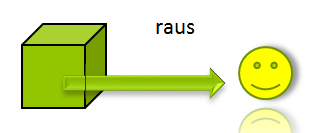
rein = hinein / herein
- „Ich gehe (in das Haus) rein.“
Similarly to: reinlaufen, reinkommen, reinfahren, reinrennen, reintragen, reinschauen, …
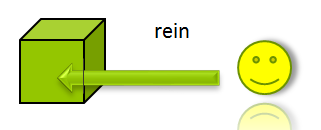
rauf = hinauf / herauf
- „Ich gehe auf den Berg rauf.“
Similarly to: rauflaufen, raufkommen, rauffahren, raufrennen, rauftragen, raufklettern,
raufbringen …
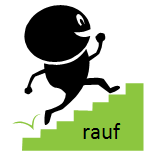
runter = hinunter / herunter
- „Ich gehe in den Keller runter.“
Similarly to: runterlaufen, runterkommen, runterfahren, runterrennen, runtertragen,
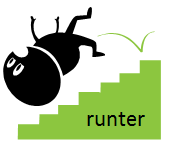
rüber = hinüber / herüber
- „Ich klettere am besten dort über den Zaun rüber.“
Similarly to: rüberlaufen, rüberkommen, rüberfahren, rübertragen, rüberbringen, …
„rüber“ bedeutet im Übertragenen Sinne: sich von einer Seite zur anderen Seite zu bewegen.
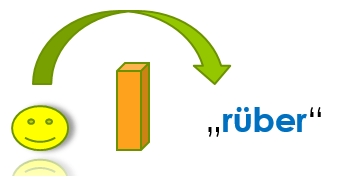
Special offer: 5 Ebooks for Free!
Do you like EasyDeutsch? When you buy my Ebooks, you get exercises and even more simple, easy-to-understand explanations, and you also actively support me. Right now there is an offer where you get all 10 EasyDeutsch ebooks for the price of 5 ebooks! Get my ebooks today at a special price: Yes, I want the ebooks and over 100 bonus lessons!
Summary
- There and back always describe a movement in a certain direction.
- „Hin“ means a movement away from the speaker and „her“ means towards the speaker.
- You can combine to and from with Local Adverbs or Verbs.
- The combination with Prepositions is mostly used only abbreviated.
Gramato: Your German Grammar Coach
Try Gramato now!
Powered by EasyDeutsch AI

This is how Gramato can help you!
Gramato helps you with all your German grammar questions – fast, to the point, and always based on the trusted content from https://easy-deutsch.com.
Gramato offers fill-in-the-blank exercises on a variety of grammar topics, tailored to your level so you can practice exactly what you need.
Get answers in multiple languages – German, English, Spanish, French, and more. That way, you can understand grammar in the language you feel most comfortable with.
Clear and simple grammar explanations – so you can learn faster and smarter with Gramato.
Ask your questions or practice anytime with Gramato – no wait, just results!
Related Topics:
Entire lesson in German only: Unterschied zw. „hin“ & „her“
Other lessons on Adverbs include are:
- Was sind Adverbien? (What are Adverbs?)
- Temporaladverbien (Temporal Adverbs)
- Lokale Adverbien (Local Adverbs)
- Konjuktionaladverbien (Conjunctional Adverbs)
- Partikel - Was sind Partikel? (Particles - What are Particles?)
- Modalpartikel - die richtige verwendung (Modal Particles - the correct use)
You can find an overview of all topics under German Grammar.
Recommendation: Free video lessons every Tuesday & Thursday
Sign up now: Email German Grammar course


